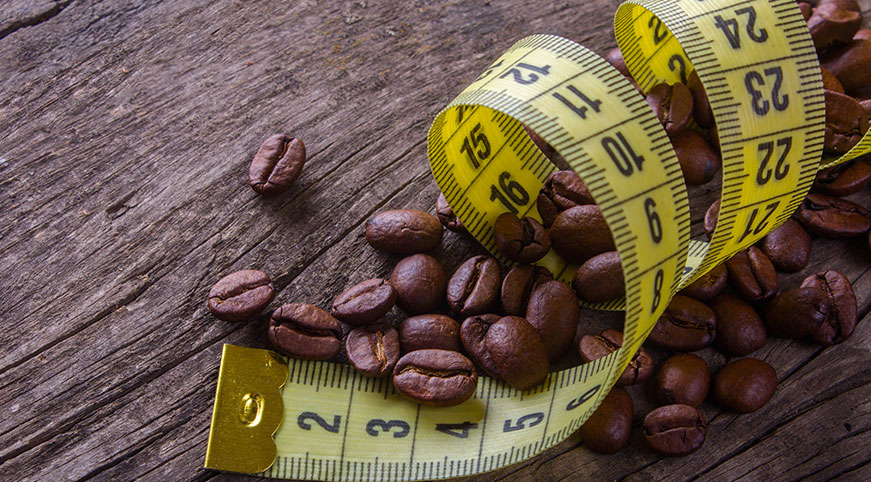For decades, diet pills with a heavy concentration of caffeine have been on the market. Gabriela Czapek, Registered Dietitian (RD) at CHA HPMC had some very insightful information for us regarding caffeine’s molecular makeup and whether or not it can truly help folks slim down.
To what extent does coffee aid in weight loss?
Caffeine may act as a diuretic, leading to loss of water stored in the body. Fluid loss in the body leads to a decrease in mass. But this is only due to water loss. It does not reflect a loss of fat and/or muscle in the body.1
There are very few studies that suggest chlorogenic acids, compounds found in coffee, aid weight loss. These are phenolic compounds. Phenolic compounds help with anti-aging, anti-inflammation. They act as antioxidants and have anti-proliferative activities. The reason why phenolic compounds may help with weight loss, is that it helps the inflammatory response (think of these as they help swelling go down after an injury).2 3
What effect does coffee have on metabolism?
Coffee can affect metabolism through reduction of fat storage by suppressing adipocyte functions. This effect is predicted to come from chlorogenic acid in coffee, which has antioxidant, anti-inflammatory and metabolic effects. Coffee can reduce storing of fat in the body by inhibiting multiplication of adipocytes, influencing transcription factors and other proteins involved in the production of lipids in these cells, and through action on gastrointestinal microbiota which can also affect obesity. Metabolic effect is achieved at daily intake of minimum 510.6mg of chlorogenic acid and 121.2mg of caffeine (one strong cup of coffee contains 60mg of pure chlorogenic acid).4
What impact does coffee have on appetite?
It may suppress appetite. The literature review indicated that coffee administered 3–4.5 h before a meal had minimal influence on food and macronutrient intake, while caffeine ingested 0.5–4 h before a meal may suppress acute energy intake.5
In what ways might coffee be counterproductive for weight loss?
Dehydration. Since coffee is a diuretic it will lead to water loss. Our bodies are made up of 60-80% water. Water is absolutely essential for many cell functions and for metabolism. Without adequate water intake, many cells may not function properly, it can also slow down metabolism.
Does taking caffeine in pill form have the same effect? Are there any risks?
It may not have the same effect, since caffeine is not the only ingredient that contributes to weight loss in coffee – chlorogenic acid is what may have a greater effect.
In this article of an extreme case, a patient experienced life-threatening psychosis caused by sibutramine-contaminated weight-loss coffee. The risk of taking a pill is that we do not know what other additives companies are adding to the supplement.6
-
Other things to consider:
- Caffeine in large doses can cause anxiety, insomnia, loss of calcium in the body leading to osteoporosis in the long run and increased risk for fractures. There are indicators that caffeine and coffee can damage sperm and prolong pregnancy. Adverse side-effects of coffee manifest only when consumption is excessive.7
- Coffee may aid in weight loss, but an individual must also be counting overall daily calories for true weight loss and not rely on only coffee/caffeine.
- Adding creamer/sugar may cancel out any effect due to the excess calories.
1 https://pubmed.ncbi.nlm.nih.gov/19774754/
2 https://pubmed.ncbi.nlm.nih.gov/21049932/
3 https://www.ncbi.nlm.nih.gov/pmc/articles/PMC6274266/
4 https://www.ncbi.nlm.nih.gov/pmc/articles/PMC8820582/
5 https://www.tandfonline.com/doi/abs/10.1080/09637486.2017.1320537?journalCode=iijf20
6 https://pubmed.ncbi.nlm.nih.gov/24345358/
7 https://www.ncbi.nlm.nih.gov/pmc/articles/PMC8820582/
 ENGLISH
ENGLISH KOREAN
KOREAN Spanish
Spanish RUSSIAN
RUSSIAN Armenian
Armenian FILIPINO
FILIPINO Chinese (Simplified)
Chinese (Simplified) Chinese (Traditional)
Chinese (Traditional)


최신댓글